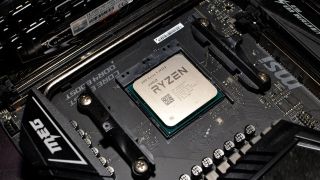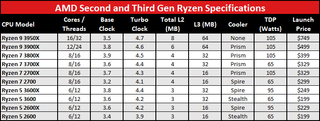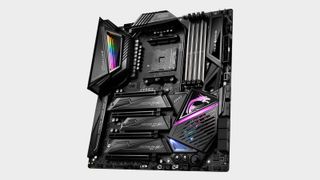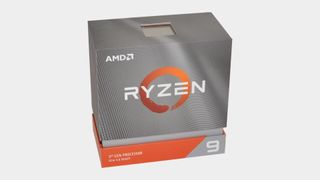AMD Ryzen 9 3950X review
A multithreaded 16-core/32-thread beast that's great for content creators and can also play games.

Back in July, AMD launched a massive 7nm offensive in the CPU world. I called the Ryzen 9 3900X "the most compelling enthusiast CPU from AMD in the past 15 years," and it's on our best CPU for gaming list. What can AMD do for an encore? More cores, more threads, potentially higher clockspeeds, naturally. I've had the Ryzen 9 3950X in house for testing for the past week or so, and it really impresses in some areas, though it's not quite as awesome in other respects.
Let's start with the best use case, which is basically anything in the content creation realm. With 33 percent more cores than the 3900X and similar clockspeeds, it's usually 25-30 percent faster. If you do video editing, 3D rendering, or any other task that can benefit from a 32-thread processor, you'll love the 3950X. For tasks that don't scale well to 16 cores, though, you're better off with a less expensive part. That's pretty much what I've been saying about all the current HEDT (High-End Desktop) processors since Ryzen 3000 arrived, but even though the 3950X is nominally a consumer CPU—it runs in the same socket AM4 motherboards as the other Ryzen CPUs—it costs a lot more. It's an HEDT CPU for a mainstream socket.

AMD's current lineup of Ryzen 3000 processors is seriously potent. They're not always the best choice for a gaming-centric build, but the difference in gaming performance between the affordable Ryzen 5 3600 and the more expensive Ryzen 9 3900X is relatively small. Ryzen 9 3950X is priced 50 percent higher than the 3900X, which might not seem like that big of a deal for 33 percent more cores, but like all of Intel's K-series and X-series CPUs it doesn't include a cooler in the box. AMD also recommends liquid cooling to get the most out of the 3950X, which is an additional $100-$200 more than the base price (depending on your cooler).
That recommendation did make me wonder just how necessary liquid cooling is, and I've got testing results for the 3950X running with both a Wraith Prism cooler as well as an extremely capable NZXT Kraken X62. You might be surprised how little difference there is in performance between the two at stock settings, though. The X62 dropped the maximum temperature by 10-15C, depending on the workload, but only ended up being about 1-2 percent faster.
AMD has doubled down on its successful chiplet strategy from the Threadripper series.
Fundamentally, the Ryzen 3950X is the same Ryzen 3000 and Zen 2 architecture as the existing third generation parts. Besides improvements to the underlying architecture, AMD also doubled down on its successful chiplet strategy from the Threadripper series. The 3900X and 3950X both feature two 8-core chiplets in the package (though one core on each of the four CCX—core complex or CPU complex—is disabled on the 3900X), whereas the 3800X, 3700X, 3600X, and 3600 all use a single 8-core chiplet.
The key is that there's also a cIOD (IO die) in the package that houses the memory controllers and other functionality, linked to one or two CCDs via AMD's Infinity Fabric. The cIOD is fabricated on 12nm tech, but it doesn't really need to be on 7nm right now. The important bit is that it provides relatively uniform memory access latencies to the CCDs, which means there shouldn't be any latency penalties with the 12-core and 16-core models compared to the 6-core and 8-core offerings.

All of that is well and good, but there's one other element to AMD's Ryzen CPUs I need to discuss before getting to the results. As part of the motherboard firmware, AMD has a package of logic functionality called AGESA (AMD Generic Encapsulated Software Architecture). This microcode handles things like memory training, infinity fabric details, and more. The very first Ryzen CPUs (back in 2017) had some serious teething problems at launch that were mostly cleared up with BIOS updates that included newer AGESA code.
The biggest gaming news, reviews and hardware deals
Keep up to date with the most important stories and the best deals, as picked by the PC Gamer team.
For this review, AMD provided AGESA 1.0.0.4 firmware that was required to properly run Ryzen 9 3950X. But changing firmware on a motherboard has the potential to affect other aspects of performance as well, and right now, with test results initially limited to a single motherboard, I'm seeing slightly lower performance in some benchmarks than I expect.
I'm pretty sure the AGESA update, or maybe just the MSI implementation of it, has affected gaming performance in a negative way. That or drivers and game updates have changed since I last tested a Ryzen CPU (which was only two weeks ago with the Ryzen 5 3600). For now, I'm not posting this as a scored review, as I want to verify performance with another motherboard.
Performance in non-gaming tasks is great, and gaming performance isn't bad… but my current numbers are worse than the 3900X and 3700X, and basically tied with the 3600X and 3600. That doesn't make any sense, considering it's supposed to have equal or higher clockspeeds than those parts, plus more cores.
Not that gamers should really be considering the 3950X. It costs $749 just for the CPU, which is more than an RTX 2080 Super that would be far more beneficial for gaming purposes. There really aren't any tasks where the 3900X or 3700X are insufficient and the 3950X is required. The 3950X will be faster at multithreaded tasks, and it's great for content creation duties, but outside of professional work it's not really necessary.
You can see my testbed at the right, which is largely the same as in previous Ryzen 3000 reviews. The main difference is that AMD also sent along a Kraken X62 liquid cooler, because air cooling isn't 'recommended'—and I stuffed everything into Adata's new XPG Battlecruiser case. I tested previously with DDR4-3200 CL14 memory and DDR4-3600 CL16 memory, and overall the CL14 RAM performed best. It's possible to manually tweak the memory timings to further improve performance, but I try to provide a realistic view of "out of box" performance.
Overclocking is a bit of an afterthought for the 3950X. You can probably do 4.1-4.3GHz on all 16 cores with the right cooling and some luck from the silicon lottery, but you'll give up maximum singlethreaded performance in doing so. At stock, I saw all-core clockspeeds hover in the 3900-4000 MHz range, depending on the workload, and games would routinely run at 4200-4300 MHz. Enabling Precision Boost Overdrive might boost performance a bit as well, and I'll look at that a bit more on some other motherboards.

Ryzen 9 3950X gaming performance
This isn't really a gaming CPU, though it can obviously be used for games. Right now, I'm aware of only one game that consistently shows scaling beyond 8-core CPUs: Ashes of the Singularity. That's partly because the game was purpose built to put a heavier load on the CPU at higher quality settings. In most other games, the 8-core/8-thread i7-9700K is just as fast as the i9-9900K, sometimes even beating it as it doesn't have to deal with the partitioning of resources that Hyper-Threading entails.
With more cores and threads but the same TDP as the 3900X, average clockspeeds may actually be lower in some workloads, and AGESA updates have just as often reduced performance while improving stability in my experience. That's all a preface to the charts that show the 3950X trailing the other third generation Ryzen parts.
All the gaming benchmarks are run multiple times, using the best result, to ensure consistency of performance. I use an RTX 2080 Ti and run at 1080p ultra (generally the highest possible settings, outside of MSAA and SSAA) to better show differences in CPU performance. If you're wondering what performance looks like at 1440p or 4K, just check out any of my recent performance analysis articles—basically, the CPU becomes less important at higher resolutions, and similarly, the CPU is less of a factor with slower graphics cards.
Minimum fps is calculated as the average fps for the bottom three percent of frametimes—find the 97 percentile frametime, and sum up all frametimes above that, dividing by the number of frames. This provides a more useful metric than pure minimum fps or pure 97 percentile.




















You can hopefully see why I'm a bit perplexed with the gaming performance of the 3950X. It's not horrible by any stretch, but there's no good reason for it to fall behind the 3700X and 3900X. Clockspeeds looked okay during testing, and it has more than twice as many cores.
Are a few games getting confused simply by having too many cores and threads available? It wouldn't be the first time. Perhaps the games are just scheduling work in a less than optimal fashion, but then why doesn't that also happen with the 3900X? Which is why I worry about AGESA or driver updates, or even game patches, as the real cause of the performance changes and need to do some additional testing.
Why not just retest everything? Because there aren't enough hours in the week to get all of that done for every new CPU launch. But I'll be updating the charts at some point, once the Black Friday deals are past.
Overall, the Ryzen 9 3950X delivers good gaming performance but not chart-topping results. It's almost a four way tie between the various Ryzen 3000 parts, with the biggest gap being less than 10 percent from the 3600 to the 3900X. As for Intel, the i9-9900K is about 11 percent faster and the limited edition 5GHz i9-9900KS is 14 percent faster. For pure gaming, Intel is still in the lead, and the 3950X doesn't even have lower pricing as a benefit… unless you include the Core i9-9980XE, which costs substantially more and still delivers worse overall gaming performance.
Ryzen 9 3950X application performance
I hope it's clear that gaming performance isn't the primary purpose of the 3950X. It can run games, but it does best when dealing with more difficult workloads that scale with core and thread counts, with clockspeed being less of a factor. That brings me to the second part of the performance overview. Check out the 3950X application performance:






















Compared to the 3900X, the 3950X is up to 33 percent faster in heavily threaded workloads. Overall, however, it's only 17 percent faster in multithreaded testing. That's partly because of the AES performance, which is oddly low, and y-cruncher likes the AVX512 capabilities of Intel's HEDT parts. Regardless, even with several different 3D rendering engines, video encoding, and cryptographic workloads, scaling beyond a 12-core/24-thread processor is difficult.
Looking at Intel's CPUs, the competition isn't even close. The 3900X already beats the 9900K and 9900KS in multithreaded performance (though a few tasks like VeraCrypt AES favor Intel's CPUs). The 3950X meanwhile ends up 44 percent faster in the overall metric against the 9900K, and 38 percent faster than the 9900KS. With twice as many cores and threads, that's hardly surprising.
Intel knows it's behind on the core and lithography battles.
What about Intel's big bad 18-core/36-thread i9-9980XE? It does manage to hang onto the overall multithreaded performance crown, but by no means is it a clean sweep. It's 12 percent faster in my aggregate multithreaded performance result, but the 3950X does claim wins in Cinebench, POV-Ray, Blender, and Handbrake. It also leads in PCMark 10 results, which aren't quite as multithreaded friendly. And it does all this while using substantially less power—I measured a bit more than 300W at the outlet with the 9980XE doing H.265 encoding, compared to 240W with the 3950X.
Intel knows it's behind on the core and lithography battles, though, which is why it has a revised Core i9-10980XE launching soon. It will be a bit faster than the 9980XE, but probably with even higher power use since it's basically still the same 14nm++ Skylake-X architecture. At least the price has been chopped in half, which is still $250 more than the 3950X, but if you want more performance and are willing to pay for it, Cascade Lake-X might be worth a look. Maybe.
Except AMD also has third gen Threadripper coming on November 25. Given the platform and architectural changes, I can't see Intel's lineup standing a chance against Threadripper in multithreaded workloads, but we'll see how that plays out in about 10 more days.


Ryzen 9 3950X is a multithreaded powerhouse
I've always said that AMD isn't in the business of selling inexpensive processors. Back in the FX era, that was all AMD really had on the CPU side, but now that AMD has competitive and even performance leading parts, prices are going up. Now it's Intel dropping prices on its three or four year old 14nm technology to stay relevant, while we wait for 10nm or 7nm desktop Intel solutions.
First, let me once again state the obvious: the Ryzen 9 3950X is not a CPU built primarily for gaming. Most gamers have a tough time justifying even a $300-$400 processor, never mind an $800 chip. You're better off with a $400 CPU and an $800 graphics card rather than an $800 CPU and a $400 graphics card if you're mostly interested in gaming. And even if you're willing to spend that much money, right now it looks like performance in games is generally slightly worse than the 3900X.
If you're doing CPU-assisted video encoding of a livestream while you game, and you want to do it all on a single PC, the 3950X might be the right choice. But then I'd argue a second modest PC with an encoding and capture card would work better. Or use NVENC GPU assisted encoding that looks better than x264 fast CPU encoding and barely impacts performance.
Where AMD's Ryzen 9 3950X shines is in the prosumer space. If you're doing serious work but don't quite have a blank check to go out and buy a $5,000-$10,000 workstation, you can get roughly the same level of performance with the 3950X and save a few thousand. It's also generally a more efficient CPU than any of the workstation or HEDT parts, because the AM4 platform keeps things sensible.
AMD deserves major props for making the CPU space a lot more interesting over the past three years.
AMD also deserves major props for making the CPU space a lot more interesting over the past three years. It's the polar opposite of the Bulldozer line of FX CPUs: excellent overall performance, a great value, efficient, and way more cores than anything Intel was traditionally willing to offer. Intel sat back delivering 4-core/8-thread desktop CPUs as its top mainstream solution from 2010 all the way to 2017, and only Ryzen changed that. Now, in less than three years, we've gone from 4-core to 8-core to 16-core processors on a mainstream platform.
And if you want to go HEDT, AMD has 32-core chips waiting in the wings, and it probably won't stop there. AMD has a great CPU portfolio right now, and I wouldn't be surprised to see Intel adopt something like AMD's chiplet strategy in future products. The 3950X would have been a far more costly product if AMD had tried to build the whole thing out of a single monolithic die.
Where do we go from here? I'm not sure. Lithography advancements are slowing down, so TSMC's 7nm will probably remain state of the art for at least another two years before we shift to 5nm, and it looks as though Intel's 7nm is still two years away. Clockspeeds aren't scaling very fast either. AMD is busily building more cores into its CPUs, hoping the multithreaded applications will come, but the 3950X is arguably well ahead of what most people need. Many of us have hit a plateau in terms of how much CPU power we need, and that's not necessarily a bad thing.
We're still years away from most people wanting, let alone needing, 16-core processors at home. Heck, outside of playing the latest PC games, I can still do 95 percent of my work on a laptop from 2014. But while my laptop is fine for typing articles and minor image editing, it chokes on more complex tasks like video editing. If that's the type of work you do on your PC, give the 3950X some serious consideration.
Jarred's love of computers dates back to the dark ages when his dad brought home a DOS 2.3 PC and he left his C-64 behind. He eventually built his first custom PC in 1990 with a 286 12MHz, only to discover it was already woefully outdated when Wing Commander was released a few months later. He holds a BS in Computer Science from Brigham Young University and has been working as a tech journalist since 2004, writing for AnandTech, Maximum PC, and PC Gamer. From the first S3 Virge '3D decelerators' to today's GPUs, Jarred keeps up with all the latest graphics trends and is the one to ask about game performance.
Most Popular


